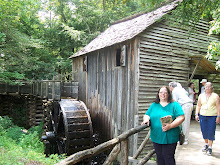This year, I didn't learn anything really earth-shattering, but more nuances to what I already had learned.
I looked up a few things about the state of travel and the roads. I came across a quote in Churchill's "Birth of Britain," the gist of which was that in Britania, a lonely outpost of the Empire--the wild west of the time, a woman could walk the roads alone from one end of the land to the other and not fear for her safety. My opinion, in the lack of anything else I could find on the subject, is that if such was the case in Roman Britain, how much more so in Judea and the Gallilee. Obviously, then as now, if undertaking a journey, one would take normal safety precautions, such as not venturing into "bad parts of town" such as the Jericho-Jerusalem road, or into Samaria, if Jewish and vice versa. But I got the feeling that for a woman to travel alone was as normal as a woman travelling alone coast to coast by plane, train or automobile would be nowadays.
We tend to look at the state of women's rights at the time of Jesus and assume that women were as restricted as they are now in that part of the world. Such may not have been the case. One thing I have found is that everything we think we know about Judaism by comparing the practices today and the laws in Leviticus, and so on, may not be what it actually was at the time for the majority of people. This is a bit of an understatement, but Judaism would have had to have changed radically after the fall of the Second Temple. Those who were scattered had to adopt some of the practices of their surrounding neighbors in regard to the women, just to ensure their own safety. People will give up freedom, and other things dear to them in order to have some level of security in life.
I was asked by one of the visitors if I didn't mean woof insted of saying weft for the horizontal threads in weaving. I prefer to use the term weft because I refuse to sound like a dog and either term is acceptable in English. One of the other spinners asked me what was the term in Hebrew, so that evening, off I went to the translation sites. I found the words for both warp and weft, but what was interesting to me was the word for warp threads, dallah, with the accent on the last syllable. Dallah indicates something that hangs down or dangles and is also weighted down--which aptly describes the warp on a warp-weighted loom! Dallah was also used to describe the "masses;" those whom we would call "pawns" nowadays. People who aren't really important in and of themselves, but hold the fabric of life together in mass and are weighted down with the cares of life.
One thing I look forward to every year with Bethlehem is the new insights I gain on the Bible. Sometimes it is only a sharpening of focus. Sometimes it is like hanging a modern art painting a different way--vertically instead of horizontally. Something that makes you say, oh! I never thought of it quite that way before. What I find is that the things that the Bible says are accurate. We have problems understanding because we have not discovered the evidence that sheds light on the text yet.
I think the most important thing I learned is that a loom cannot be warped in strife or stress if you want the weaving to turn out right. You must be calm and focus. You must not be concerned about how much time it is taking or how long you are going to be. That is the path to discouragement. Making the heddles is tedious and time consuming, but you have to go through it--like pregnancy--only it doesn't take nearly that long. I also learned that the groups of 10 warp threads need about 5 or 6 ounces of weight each to hang properly, and each air-dried clay donut weighs about one ounce each. I had to make more weights this year.
Those whose hope is in the Lord will be restored.
They shall fly on eagles' wings.
They will not be wearied from running,
Nor will they faint from walking.

No comments:
Post a Comment